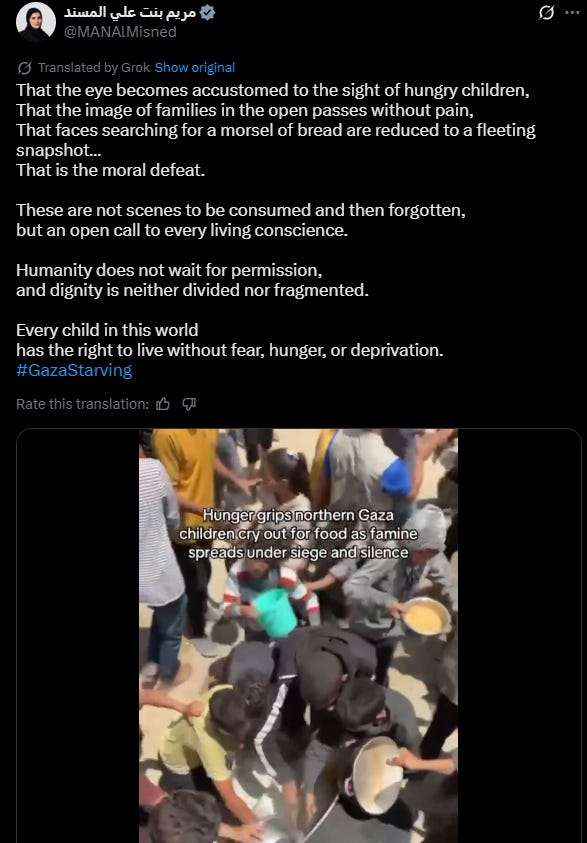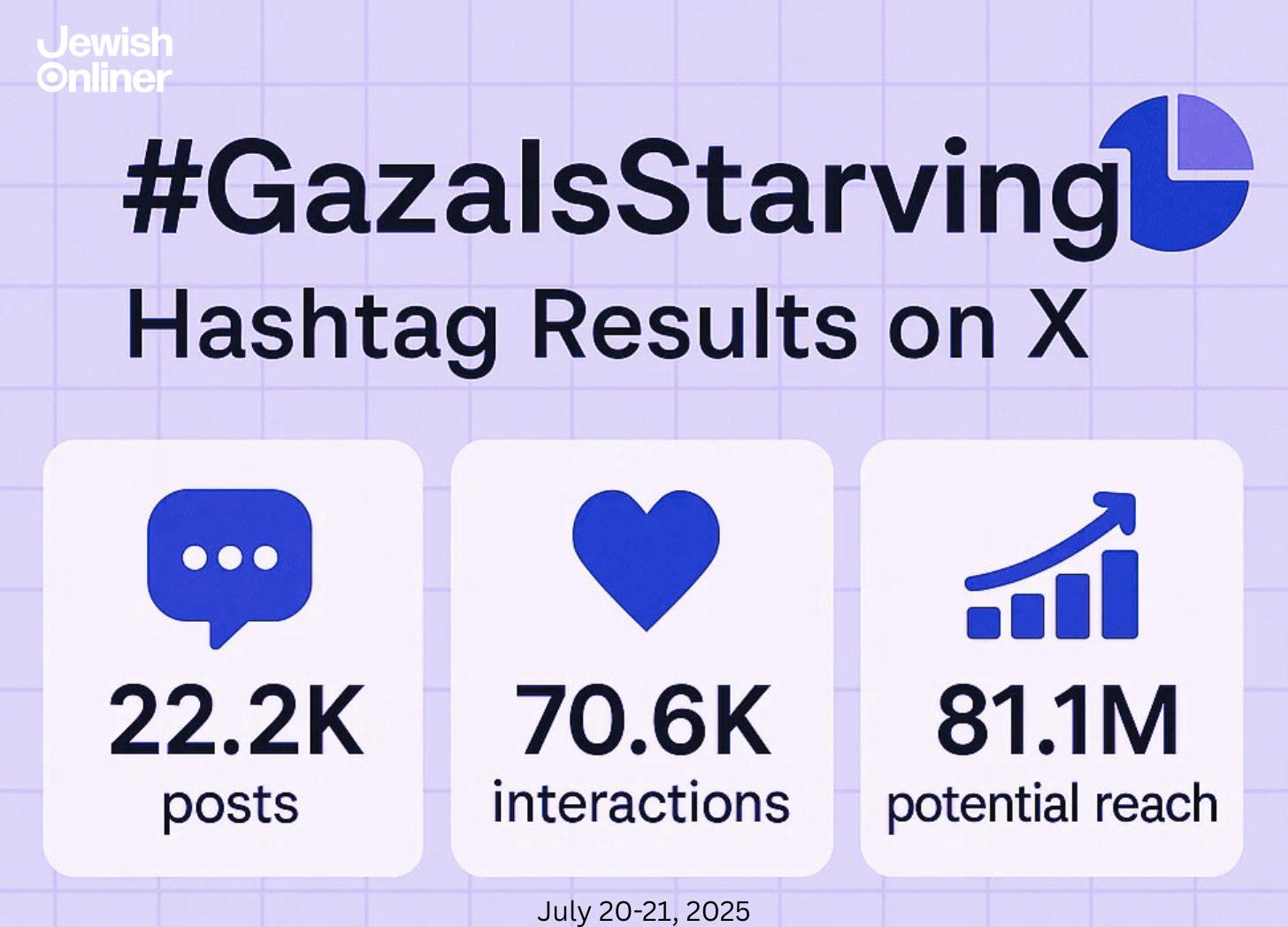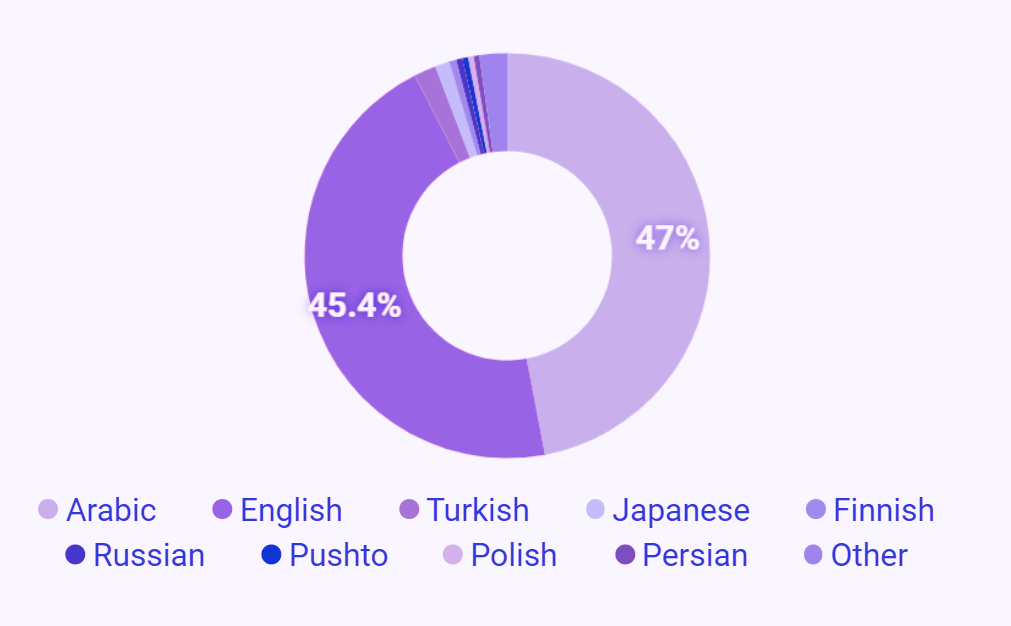Qatari-Backed #GazaIsStarving Campaign Reveals Coordinated Disinformation Effort
Al-Jazeera amplifies the "#GazaIsStarving" hashtag — a new analysis by Jewish Onliner reveals a coordinated disinformation effort from Arabic-speaking countries to sway English-language discourse
Al-Jazeera has amplified a widespread social media campaign using the hashtag "#GazaIsStarving," but new analysis reveals a coordinated disinformation operation primarily driven by Arabic-speaking countries to influence English-language discourse. Despite generating considerable digital engagement, the campaign's starvation claims appear questionable given that over 700 aid trucks currently await distribution within Gaza, while Israel has facilitated approximately 4,500 truck deliveries in recent weeks.

An analysis by Jewish Onliner reveals the campaign has generated over 22,200 posts, 70,600 interactions, and reaching an estimated 81.1 million users in just 24 hours.
However, the research exposes the foreign-driven nature of this English-language campaign, with nearly half of all posts written in Arabic and originating from users across the Middle East, suggesting a coordinated effort to manipulate English-speaking audiences through cross-linguistic influence operations.
Cross-Platform Mobilization Strategy
According to Al-Jazeera's own reporting, the Arabic version of the hashtag appeared in more than 227,000 posts on X (formerly Twitter) by Sunday, where it topped the platform's trending list. The Arabic version has also been used in more than 5,000 posts on Instagram, indicating a multi-platform approach designed to maximize reach across different demographic segments while simultaneously targeting English-speaking audiences through coordinated cross-linguistic campaigns.
Geographic Distribution Analysis Targeting English Audiences
The Jewish Onliner analysis reveals the international scope of the English campaign's digital infrastructure. The predominance of Arabic-language content (47% of posts) within the English hashtag combined with significant participation from Saudi Arabia (21%), Yemen (10.7%), Qatar (3.5%), and Turkey (3.4%) indicates a concerted effort to bridge Arabic-speaking social media communities with English-language platforms.
This geographic distribution pattern suggests coordination that extends beyond organic grassroots engagement and represents a deliberate attempt to influence English-speaking audiences through foreign-originated content.
Additional accounts promoting the English hashtag include influencers based in Yemen, Oman, and Dubai, further emphasizing the foreign-driven nature of the English-language social media campaign. This geographic spread raises questions about the organic versus coordinated nature of the digital movement specifically targeting English-speaking social media users.
Strategic Timing and State Involvement
Dr. Ariel Admoni, a PhD in Middle Eastern Studies focused on Qatar, analyzed the strategic nature of the English campaign's timing in an X thread. His research suggests there has been an observable increase in the pace of hunger-related reports from Gaza, which appears to function as a pressure tactic on Israel during ongoing negotiations in Qatar. This timing correlation raises questions about whether humanitarian reporting is being strategically deployed to influence diplomatic outcomes.
Dr. Admoni pointed out that the English campaign's reach extends beyond media outlets to include direct participation from Qatari government officials. For example, the Qatari Minister for International Cooperation, who typically publishes content about diplomatic meetings, uploaded a video of famine footage with text in both Arabic and English. This bilingual approach demonstrates how the campaign operates across multiple levels of Qatari state apparatus specifically to target both Arabic and English-speaking audiences, suggesting coordinated state-level information operations.

Malicious Amplifiers
The English campaign's promotion through concerning accounts raises questions about its underlying networks. Key amplifiers include Fadel Naim, a Gaza-based doctor with documented family ties to Hamas, whose medical credentials provide apparent legitimacy to the English campaign's health-related claims.
Another significant promoter is Seyed Mohammad Marandi, an Iranian regime propagandist who has defended executions of anti-government protesters. Marandi, the son of Alireza Marandi (Ali Khamenei's personal physician), previously served as an advisor on Iran's nuclear negotiating team and publicly stated he would not "shed tears" over the 2022 stabbing of author Salman Rushdie in New York.
The International Committee to Break the Siege (ICBSG) is another key amplifier behind the English hashtag's propagation. This organization, historically responsible for organizing flotillas to Gaza, is chaired by Zaher Birawi, who has been designated by Israel as a key Hamas operative in Europe. The involvement of such organizations suggests the English campaign extends beyond individual social media users to include coordinated institutional support.
Digital Influence in the Information Age
The English #GazaIsStarving campaign exemplifies how modern influence operations leverage emotional humanitarian appeals, coordinate across linguistic and geographic boundaries, and exploit platform algorithms to achieve strategic communication objectives targeting English-speaking audiences.
While legitimate humanitarian concerns exist regarding conditions in Gaza, the English campaign's apparent coordination, concerning network connections, and disconnect from available aid data suggest objectives that extend beyond humanitarian advocacy.






This campaign is part of a deliberate disinformation strategy aimed at delegitimizing Israel and shielding Hamas from accountability. Spearheaded by Arabic-speaking regimes and amplified by outlets like Al-Jazeera, the goal is to manipulate Western public opinion by weaponizing emotionally charged, humanitarian imagery. This narrative warfare seeks to isolate Israel diplomatically, pressure it into a premature ceasefire, and distract from Hamas’ own exploitation of aid and use of civilians as human shields.
Excellent article. Absolutely a disinformation campaign, deep and widespread concerning everything from political history to current news. I believe there is also a case for Democide, the strategic destabilization of Palestinian territories and deliberate harm to the people, including their deaths. This includes interfering with food aid and medical supplies, human shields, converting civilian locations into military posts including schools and hospitals.
At one point their leaders called for more Palestine martyrs more dead. Aren't there videos of children being trained to sacrifice themselves for Allah. Their 'resistance 'motto is Death for Allah is our most coveted desire'. A man calls out to the crowd, 'Don't mourn your children they are replaceable. Mourn for for our lost pride".
This is Democide, a human rights crime , and a crime against humanity.